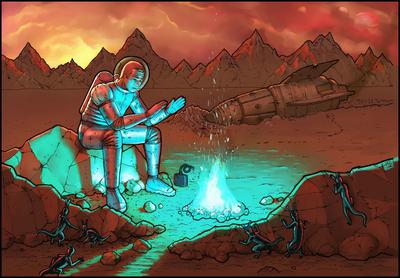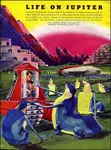Humanity's place in the OSS
by Dylan
(Illinois, Wisconsin )

Zendexor has stated that Earth is the king planet. But are we, children of Earth, also kings?
In the (disappointingly) real Solar System, I'd say yes, simply for a lack of contenders to the throne. While this might be a good thing from an ethical standpoint (no aliens for us to play mighty-whitey in a pith helmet with), it does leave something to be desired.
So what then of our status in the OSS? That is the subject of many stories, either directly or indirectly.
Many science fiction writers like to point out that we are not the masters of the universe we think we are. H.G. Wells comes to mind, with The First Men in the Moon questioning our power on other planets, and The War of the Worlds questioning our right to even our own. Wells makes a compelling argument that the solar system is not our domain.
But other authors take the opposite view. Edgar Rice Burroughs dreams up heroes who, finding themselves on other worlds, quickly adapt and thrive in their new environments. They even come to rule the natives they find, marrying princesses or overthrowing rulers. John Carter finds his Earthly muscles make his strength seem stupendous, and Carson gains supernatural abilities. Wherever Earth men go, they quickly rise to the top of the food chain.
Then there are some who walk a path between the two. Leigh Brackett, a favorite author of mine, shows us a Solar System where Earth men do indeed hold the planets in their hands, but their grip is tenuous. Native uprisings and resistance frequently thwart them and leave pompous Earthers bleeding on the ground. Even though humans are dominant, this is not necessarily seen as a good thing, and Brackett's main protagonist, Eric John Stark, always sides with aboriginal people over colonists.
Another author, Rex Gordon, holds a similar though slightly different view. In his book No Man Friday, our hero (spoilers) encounters Martians who are utterly indifferent to any of the things he thinks are important. They also possess powers of a seemingly supernatural nature, able to keep the hero's rescuers from exploring the planet. To these Martians, we are neither kings nor enemies, we are simply nuisances to be ignored and contained.
I am sure that other authors have other things to say. What are your thoughts?
Dylan






























